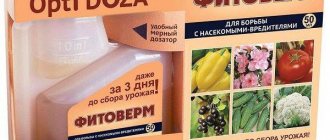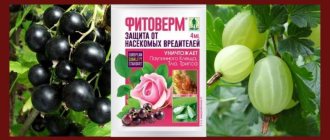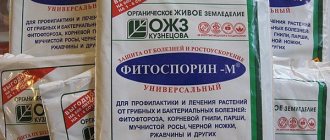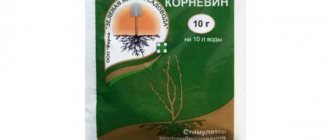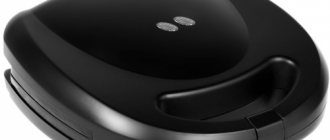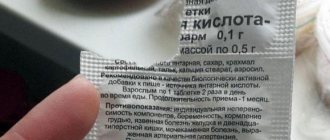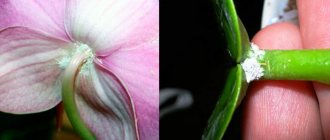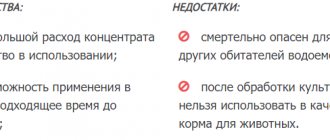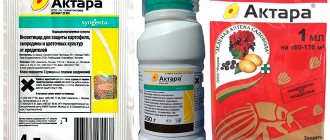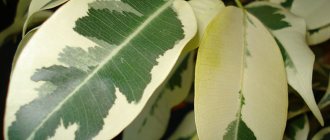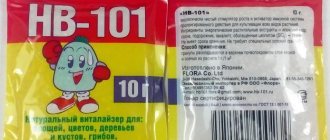In this article I will tell you how to dilute the drug for home flowers in order to achieve the final destruction of harmful living creatures.
Description of the drug Fitoverm
The product has a biological basis and is produced in Russia. It is destructive to many ticks and sucking or gnawing insects, that is, it is both an acaricide and an insecticide.
The drug is sold in vessels of different capacities:
- Ampoules of 2, 4 and 5 milliliters.
- Bottles of 10, 30, 50, 100, 200 and 400 milliliters.
- 5 liter canisters.
For home floriculture, it is better to take the minimum packaging - 2 milliliters. After dilution, this volume is enough to treat all indoor plants, even if there are many of them.
Fitoverm rids open and closed ground crops of many pests:
- aphids;
- scale insects;
- gall mites;
- whiteflies;
- leaf roller;
- caterpillars;
- thrips;
- moth;
- mealybugs.
The drug is marketed in the following forms:
- Fitoverm M is enriched with a special contact adhesive, which enhances the effect of treatment.
- Fitoverm Forte has a more powerful effect.
- Fitoverm P is produced in powder form and is intended to combat nematodes.
The active ingredient of Fitoverm is aversectin C. It is a natural toxin produced by the soil radiant fungus Streptomyces avermitilis.
The poison penetrates the body of the parasites through the contact-intestinal route and, on average, paralysis occurs after 16 hours. Insects stop feeding and die of hunger 2-3 days after spraying. Mass extermination of insects occurs on the 5-7th day.
Composition and properties of Fitoverm
This is an insecticidal agent that is obtained thanks to the natural secretions of soil microorganisms. The main substance that leads to the death of a parasitic insect is Aversectin S. It penetrates deep into the body and affects the nervous system, causing its paralysis. With prolonged contact, the insect loses its appetite and dies after 2-7 days.
How to properly use Fitoverm for indoor flowers
For a good result from treatment with Fitoverm, three main conditions are observed:
- Warm. After spraying, the flowers are kept at a temperature not lower than +25 degrees. The drug almost does not work at temperatures below +18 degrees.
- Multiple treatments.
At a temperature of +20...25 degrees, the solution is sprayed 3-4 times with an interval of 7 days. If it is hot at home, the break is reduced to 5 days. - Times of Day. Fitoverm quickly loses its strength under solar radiation, so it is better to do treatments in the pre-sunset hours.
Fitoverm does not affect insect larvae and eggs. Only repeated use deprives pests of a chance to restore the population.
I recommend performing at least 4 applications, even if after spraying three times the insects have completely disappeared. But then for the last time use a weak solution with a concentration of 2 g/l.
To prevent mass infection, be sure to spray not only the plant being attacked, but also its neighbors on the windowsill or shelf.
The solution is applied to dry leaves using a fine spray bottle. If there are few leaves, it is good to use sponges or cotton pads.
To ensure success in the fight against parasites, spraying is carried out at the earliest signs of their presence on a houseplant.
Treatment begins at the top of the flower and gradually moves down to the lower tier of the plant. At the same time, the front and back sides of the leaf plate are generously moistened - this is where the majority of pests usually hide.
The remains of the solution are spilled onto the soil in the pots. This allows you to kill off insects that are still sitting in the soil.
For 24 hours after applying the solution, domestic flowers are not watered and the air around them is not humidified. The fact is that the drug quickly deactivates at high humidity .
Advantages and disadvantages
Pros and cons
The drug is absolutely safe for plants;
does not pollute the environment;
efficiency in the fight against plant mites – 100%;
destroys pests at high temperatures;
allowed during the flowering period.
short period of action;
high cost of processing compared to other compounds;
poor interaction with other drugs, especially alkaline ones;
low efficiency in conditions of high humidity;
poorly wets the surface of leaves and buds.
Instructions for using Fitoverm for different indoor plants
Violet
Flowers often suffer from aphids, mites and thrips. To save violets from harm, their flower stalks are removed and the entire green part is sprayed. The procedure is performed 3-4 times with an interval of 4 days.
The soil in the pots should also be thoroughly moistened with the drug solution or even replaced with a new one.
It is advisable to supplement the solution with Solvet-Gold (according to the instructions). It facilitates the distribution of poison across the leaves.
Treated plants are temporarily removed to a dark place, otherwise unsightly spots may appear on their leaves.
Orchid
Aphids on an orchid
Fitoverm effectively saves orchids from mites.
To save the plant, proceed in the following order:
- The flower is taken out of the container and the container is treated with a strong solution of potassium permanganate.
- The roots are carefully freed from the substrate, washed under gentle pressure of warm water and placed in a weak solution of the drug for 10 minutes.
- The leaves are well moistened with the solution, after which the plant is moved to a dry, shaded place for a day.
- Then the flower is planted in new clean soil.
Lily
The crop is susceptible to infection by thrips, mites, whiteflies and aphids.
Lily leaves are wiped with a solution of the drug on both sides. This causes death in gnawing insects after 6-8 hours, in sucking species - after 1-2 days.
The last treatment is performed after three weeks.
Ficus
Reddish-brown and dirty yellow spots often form on ficus leaves. These are traces of scale insect activity.
The greenery of the plant is wiped with a soft cloth soaked in bioinsecticide. It is useful to alternate treatments with Fitoverm with spraying with tobacco infusion.
Don't forget to generously spray the soil around the plant. In total, 2-3 treatments are done with an interval of 1.5-2 weeks.
Reviews about the use of the drug for flowers
Lyudmila: “I regularly treat all indoor flowers with Fitoverm. They are on the balcony on the first floor, so someone is always getting into them. There were no problems with the drug. The main condition is to treat several times, even after the symptoms disappear.”
Evgeniya: “I tried to save the violets from the mite. I put the flowers in the bathroom and thoroughly treated them with a 2 ml solution, but the drug did not help. I probably discovered the problem too late.”
Ekaterina: “I have 5 orchids. Recently I found mites under the leaves on two flowers. Just in case, I treated the entire flowerbed at once: 3 treatments, dosage 2 ml/l. I’m happy with the result, now the flowers are in perfect order!”
5/5 — (1 vote)
Hazard class and precautions
Fitoverm belongs to the means of medium danger level. This means that when working with it, exposed skin and especially mucous membranes should be protected.
They cover their heads with a scarf, wear clothes with long trousers and sleeves, and hide their faces under a mask and glasses. In all manipulations with the drug, thick, waterproof gloves must be used.
It is better to carry out processing on an open balcony or in a well-ventilated room.
While spraying the solution, it is prohibited to eat, drink, or smoke. Signs of Fitoverm poisoning include nausea and vomiting. If the solution accidentally gets inside the body, you should immediately drink plenty of water with activated charcoal and cleanse your stomach.
The remaining solution is poured under the plants or into the toilet.
The unopened drug is kept in a dark and dry place where it is inaccessible to children and animals. Shelf life - 2 years.
The drug is compatible with bioregulators (Epin Extra, Zircon), organophosphorus insecticides and pyrethroids. It should not be combined with alkaline products and chemical pesticides.
A universal rule applies here: if you mix two drugs and observe precipitation, it means they do not mix well with each other .
Consumption rates
Application rates for different crops differ, for flowers:
- on garden flowers against thrips 8 ml per 1 liter of water, spraying during the growing season and flowering
- on garden flowers against aphids 4 ml per 1 liter of water, spraying during the growing season and flowering
- on indoor flowers and plants against thrips 2 ml per 200 ml of water, spraying when pests appear
- on indoor flowers and plants against aphids 2 ml per 250 ml of water, spraying when pests appear
- on indoor flowers and plants against ticks 10 ml 1 liter of water (the dosages indicated in the instructions 2 ml/l are ineffective)
Spray against thrips and aphids up to four times, against ticks no more than 2 times, then change the product.
For fruit trees and shrubs
- on apple, pear and currant trees against ticks, leaf rollers, moths 1.5 ml per 1 liter of water, spraying twice during the growing season
- on apple trees, pears against codling moths and cutworms 2 ml per 1 liter of water, spraying once during the growing season
- on currants against mites 2 ml per 1 liter of water, spraying during the growing season
On vegetables:
- on cucumbers, peppers and eggplants, tomatoes against ticks and thrips 10 ml per 1 liter of water, spraying twice during the growing season
- on cucumbers, peppers and eggplants against aphids 8 ml per 1 liter of water, spraying twice during the growing season
- on cabbage against cabbage and turnip moth, cabbage cutworm, cabbage moth - 4 ml of fitoverm per 1 liter of water, spraying twice during the growing season
- on potatoes against the Colorado potato beetle 1 ml per 1 liter of water, spraying up to 3 times during the growing season
Toxicity
Fitoverm belongs to the class of avermectins. Despite the fact that the packaging may say hazard class 4, this is not so! Preparations based on aversectin C belong to the third class of danger to humans and the second and third classes of danger to bees! The information that it is not phytotoxic is correct. The half-life of aversectin C in water is 3 days, and in soil – 25-30 hours.
Security measures.
Processing should be carried out using personal protective equipment. While working, you must not smoke, drink, or eat. After work, wash your face and hands with soap and rinse your mouth. Store the drug in a cool, dry room at a temperature from -15C to +30C, separate from food and medicine, out of the reach of children and pets! Storage of the working solution is not allowed. When used on private farms, mixing with other drugs is prohibited.
First aid for poisoning:
If the drug gets on the skin, wash off with soap and water; In case of contact with eyes, rinse thoroughly with running water; if it enters the digestive tract, drink 3-4 glasses of water, induce vomiting, take several tablets of activated carbon, seek medical help.
Waiting times
- avermectins are quickly destroyed by sun and moisture;
- the decay period on the soil surface is a day, on plants – no more than 72 hours;
- half-life in water and soil is 1-7 days;
- the drug has low toxicity for bees; after evening treatment it becomes absolutely safe every other day.
The poison remains in the bodies of insects and ticks for 7-20 days. Even if they survive, they become less voracious and their ability to reproduce decreases.
The drug is safe for plants (non-phytotoxic) and does not accumulate in their organs. After spraying, the fruits can be collected and eaten after 48 hours.
Doses for plants
This is how the drug “Fitoverm” is used. The instructions for use discussed above, as you can see, do not include too many steps.
One ampoule of the product usually contains 2-4 ml of the drug. The table below shows its dosage for popular plant species.
| Culture | Pest | Dose (ml/l water) | Periodicity |
| Pumpkin, tomatoes | Mite | 2 | As it appears |
| Thrips | 0.2 | 15-20 days | |
| Aphid | 0.3-0.5 | ||
| Apple tree | Ticks, leaf rollers | 1 | As it appears |
| Currant | Ticks, moths, leaf rollers | 1 | |
| Houseplants | Mite | 1 | |
| Thrips | 0.2 | ||
| Aphid | 0.25 | ||
| Cabbage | Caterpillars of armyworms and white moths | 0.5 |
As you can see, the dose is usually not too high. For some other plants, a stronger solution of the Fitoverm preparation should be used. The instructions for use for strawberries given above confirm this. The fact is that ticks on this plant, unlike bushes and fruit trees, are very difficult to remove.
In order for this drug to work, it must enter the insect's body. The pest must eat leaves during treatment. However, some insects feed periodically every other day. Therefore, after a couple of days it is advisable to carry out a control treatment. The above doses must be observed. This is a guarantee of operational safety and effectiveness of the Fitoverm drug. The instructions for use must also be followed exactly. Do not spray plants in cold weather or during the heat of the day.
"Fitoverm": pest control
Although this is an active biological agent, the drug does not harm the environment, does not accumulate in fruits and is suitable for use in confined spaces (greenhouses, greenhouses and residential premises).
Mealybug
To combat the parasite, you will need to dissolve 2 ml of the drug in a glass of water. A houseplant is treated with this solution; usually 3–5 treatments are enough, once every three days.
Scale insects and false scale insects
These pests are capable of multiplying at lightning speed and spreading quite quickly throughout all available plants . As a result of the activity of the scale insect (false scale insects are more often found on coniferous species), the flower dies.
It is important not to miss the moment when the female’s shell is still soft and allows contact poison to pass through. You need to treat with a solution of 200 ml of water and 2 ml of the drug, at least 3 treatments will be needed, after the 5th the insects usually die.
Ticks
To combat arthropods, the preferred dosage is 2 ml of the drug per liter of liquid. Treat for spider mites at least 3 times, taking breaks for three days.
Sciarides
Sciarides, or “fungus gnats,” are annoying black midges, against which the drug is effective. The midge itself does not pose a danger to flowers, but its larvae seriously harm plants.
For spraying, prepare a solution of 2 ml per liter of water. Spray 3-5 times with an interval of three days.
Fools
Ground fleas are small pests and are very difficult to notice. Often it is not possible to determine the death of a flower. The dosage of the drug for treatment is similar to that used to combat ticks and sciarids.
Whiteflies
Whiteflies are easy to spot on a plant - they are very active insects with noticeable colors. They are poisoned with a 1% Fitoverma solution, treating them at least 3 times with an interval of 3–5 days.
Thrips
They multiply extremely quickly and do not discriminate between indoor plants. If thrips get on one flower, the infection will soon spread to all the plants in the apartment.
To combat parasites, dilute 2 ml of the drug “Fitoverm” in a glass of water and carefully treat the leaf plates, stem and flowers.
Then the pot with the flower is placed in a tight sealed bag and kept there for a day. The procedure must be repeated every other day.
Fruit midges
The drug is also suitable for combating fruit flies. Dosage: 2 ml per 200 ml of water. Treatment once every three days with a frequency of 3–5 days.
To combat aphids, “Fitoverm” is diluted in a dosage of 2 ml per glass of liquid and treated at least 4 times every three days.
Impact speed and compatibility
“Fitoverm” is compatible with:
- growth regulators (Ribav-Extra, Zircon, Epin);
- organophosphate insecticides;
- the main pesticides that are used to treat indoor flowers;
- with pyrethroids;
- fertilizers;
- fungicides.
6 hours after using the drug, gnawing insect pests do not eat and freeze for 2-3 days. And then they die.
Sucking insects need more days. They stop eating after 12 hours and die after 2 days. The bulk of them die after 5-7 days. And the leaves of the flowers retain the poison for 1-3 weeks. According to experiments, the drug has the worst effect on aphids.
Real reviews
Fitoverm erodes in air and destroys pests within 3-4 hours. This is enough to eliminate adult insects. At 20°C, plants are treated once a week and so 3-4 times. At 30°C - after 3-4 days. I pour an ampoule into a 0.5 liter bottle. Then I cover it with a bag and leave it for 24 hours. As a result, all harmful insects died.
matilda31, Russia, Kursk
I added the Fitoverm ampoule to 250 ml of water. After thoroughly spraying the plants, the solution destroyed the aphids. Flowers after spraying have no smell of the product. I recommend.
Malinkin, Belarus, Mogilev
Fitoverm is an effective drug; as a rule, I treated it 2 times every 7 days.
The drug destroyed pests on roses and gardenia. After spraying with the product, I sprayed the plants with Epin. All flowers recovered.
Fitoverm is a biological product that has established itself as an affordable and easy-to-use insect repellent. It is suitable for processing not only garden crops, but also for caring for house plants. The insecticide is used in home gardening to care for delicate flowers; it is mildly toxic and has a quickly manifested effect. Due to the fact that the dosage of Fitoverm varies for different indoor plants, gardeners often have the question of how to dilute the drug.
Mechanism of action and active substance
Since Fitoverm is a biological product, its active ingredient is made from the metaplasm of fungi living in the soil. Mushrooms belong to the genus Streptomyces. A substance called aversectin C is isolated from the metaplasm, which is the basis of the biological product.
When animals devour the leaves and shoots of a plant irrigated with a biological product, aversectin C enters the gastrointestinal tract of the pests and, penetrating through it into the cell tissue, begins to act after 12 hours. A paralyzed pest cannot move and, accordingly, cannot feed. As a result of exhaustion, the insect dies 72 hours after the product begins to act.
Treatment of indoor and other plants with Fitoverm against sucking insects and acarids has a somewhat slower effect, so the pests die no earlier than after 5-7 days.
Due to the fact that the effect of the product occurs through the stomach, the larvae do not die. To completely destroy all insects, at least three to four treatments will be required.
Did you know? Decomposition of an insecticide that gets into the soil occurs within 24 hours; in open space it disintegrates after two days. The decay period of other products is about a month.
Safety precautions for use and storage
It is moderately dangerous for bees and fish; when plants are in bloom, it is forbidden to spray them with the product. The substance must not be allowed to enter water bodies. It has a hazard class 3 in relation to people and animals.
When spraying, do not forget to wear a gown, goggles, gloves and a respirator.
People who use the drug may develop allergies. Because of this, it is used while observing safety precautions, wearing a gown, gloves, goggles, and a respirator.
When processing plants, you should not eat, drink, or smoke. After spraying, thoroughly wash your hands and face with soapy water and rinse your mouth.
The sachet left over from the drug is burned, trying not to inhale the smoke. Do not throw the bag into water.
The substance can be stored for 2 years at t = -15˚С to 30˚С. Keep the storage area cool and dry. You cannot put food or medicine in it.
The estimated cost of the Fitoverma package (4 mg) is 16-18 rubles .
Indications for use of "Fitoverm"
The drug is intended to combat various types of parasites: insects, arachnids (including ticks), nematodes. The concentrated emulsion is used in the fight against the most dangerous pests of garden plots. These include:
- spider mites, gall mites;
- aphid;
- mole;
- scale insect;
- hawk moths;
- leaf beetles;
- bark beetles;
- gall midges;
- thrips;
- scoops;
- weevils;
- silkworms;
- leaf rollers.
Fitoverm against spider mites and other pests is used on different types of plants:
- fruit;
- berry;
- citrus;
- decorative;
- vegetable crops.
In case of a spider mite attack, it is allowed to use the drug on open and closed ground, as well as indoors (for treating indoor plants). Signs for which the use of this product is recommended:
- change in leaf shape;
- the appearance of light spots on the tissues of the above-ground part of the plant;
- inhibition of plant growth;
- deformation of buds, fruits;
- web formation.
Application of Fitoverm in its dosage
In what case is it used?
Fitoverm is a biologically active drug that destroys common and red spider mites, aphids, thrips, and leaf-eating caterpillars.
All compounds that destroy harmful insects are divided into 2 groups:
Contact ones fall on the integument of pests and destroy them, and intestinal ones enter the intestines of insects; they eliminate pests only after 3-4 days. Fitoverm has a double effect, it is both contact and intestinal.
How to use - step-by-step instructions
To obtain a working solution of Fitoverm, you need to dilute 1 ampoule (5 ml) in water. Read the instructions carefully.
To destroy pests of indoor plants, treatment is done 4 times, with an interval of 7-10 days between treatments:
- against spider mites, pour 1 ampoule into 2.5 liters of clean water;
- for aphids, add 1 ampoule to 0.6 liters of water;
- for thrips, add 1 ampoule to 0.5 liters of water.
Use any sprayer that sprays. Moisten indoor flowers evenly, since the poison begins to act only after the pests come into contact with the skin, as soon as they eat the leaves that are soaked in the poison.
Analogs
To increase the activity of Fitoverm, a new form of the drug has been developed - Fitoverm M , effective against Western flower thrips. To avoid phytotoxic doses, the drug should be used in a concentration of no more than 0.5%. The required number of treatments is two to three procedures with an interval of 5-7 days.
If there is no effect, Fitoverm is alternated with the systemic insecticide Confidor.
Analogues of Fitoverm are represented by the following drugs:
Each of them is used according to its instructions.
Advantages and disadvantages
Among the advantages of the drug Fitoverm the following can be noted:
- Effectively fights about 20 types of pests.
- It does not penetrate into the plant or fruit through plant membranes, therefore it does not accumulate in the fruit.
Important! Fitoverm can be used during fruiting without harm to human health.
- Can be used at any phase of plant development when parasites appear.
- Becomes more effective at high temperatures.
- Does not inhibit treated plants.
- Disintegrates quickly in the ground.
- Does not have resistance.
- It is sold in containers of different volumes, so it is convenient to use a specific dosage.
Over the many years of using the drug, several disadvantages were discovered:
- High price. Fitoverm is several times more expensive than other insecticides.
- Relatively weak efficiency. Since this is a biological substance, plants must be processed several times to obtain the desired result, but it does not cause significant harm to crops.
- Cannot be combined with other pesticides.
- Harmful to honey insects.
- Has an unpleasant odor.
- Not suitable for soil treatment, as the substance quickly evaporates.
- Loses effectiveness upon contact with water. Therefore, during processing, an adhesive substance must be added to the solution. For example, soap.
Plants must be processed in clear weather without precipitation, otherwise the procedure will not bring results.
For spraying use a fine spray. The product is evenly distributed over the leaves.
Advice! Treatment is carried out in the evening, since in the dark avermectin B1 slowly decomposes and the effect of the drug will be longer.
Spraying is not carried out during precipitation and at air temperatures below +17 °C.
What does a scale insect look like?
The name of this parasite is due to the presence of its shell. Thus, although it is small in size, it is reliably protected. The pest drinks the juices of both indoor and garden plants and does not shy away from even poisonous ones. Forms colonies. Active throughout the year. Females are yellow to brown in color and have no legs or wings. Males are usually white, pink, red or orange, and females have legs and wings. Scale insects become motionless, finding a place for themselves on the plant and look like tubercles.
The false scale insect does not have a shell. By this sign you can determine what type of pest is in front of you. If you remove a scale insect from a plant, the shell will first come off.
